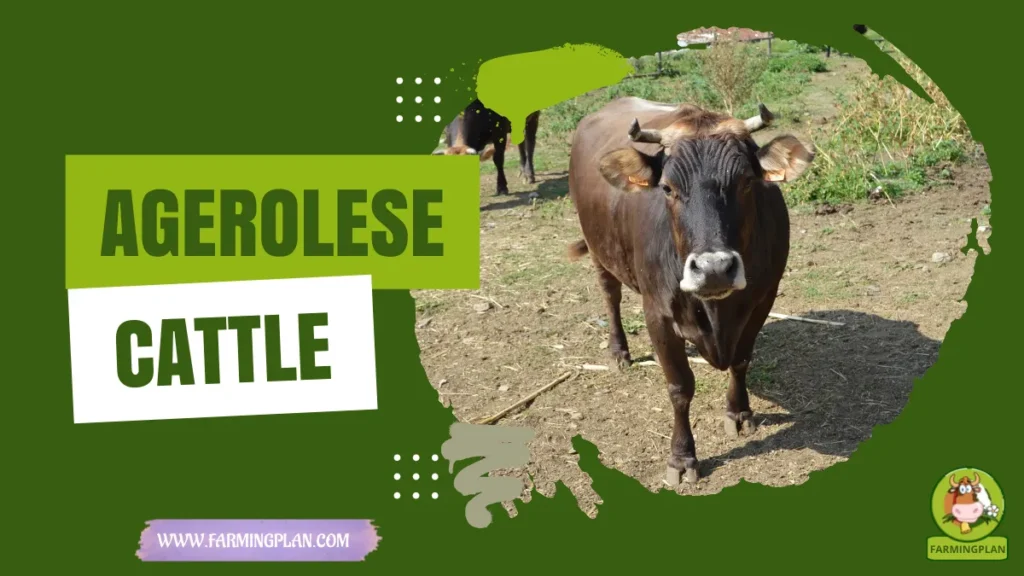The American Yorkshire Pig is a highly popular breed of swine known for its lean meat, rapid growth, and excellent mothering abilities. Farmers across the world favor this breed for its strong carcass merit, efficient feed conversion, and adaptability to different environments. With roots tracing back to 18th-century Yorkshire, England, this versatile pig has grown into one of the largest and most productive pig breeds in modern commercial meat production. Whether you’re a breeder, hobbyist, or pork producer, the American Yorkshire offers reliability, performance, and top-quality pork — making it a smart choice for anyone in the swine industry.

History & Origin
The story of the American Yorkshire Pig begins in the 18th century in Yorkshire, England, where early farmers aimed to create a strong, durable pig breed that could thrive in harsh climates and produce quality meat. Influenced by agricultural innovator Robert Bakewell, early breeders focused on selective breeding to improve the pig’s muscle-to-meat ratio, growth rates, and temperament.
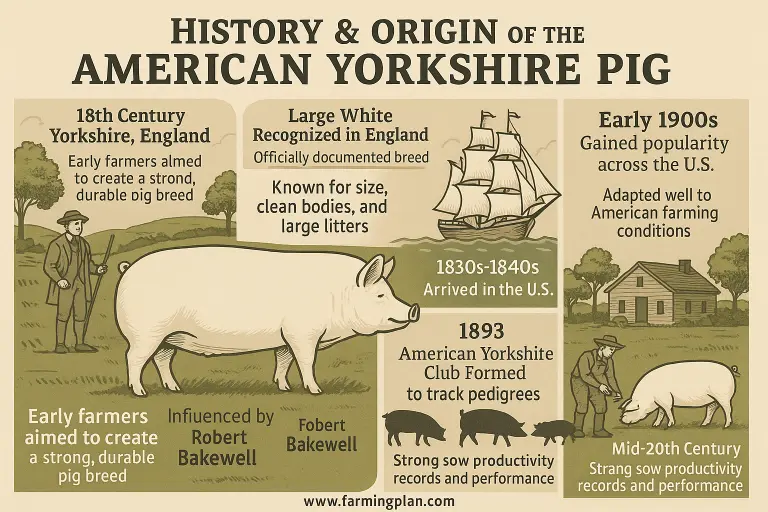
The breed was officially recognized and documented as the Large White in England. These pigs were known for their size, clean bodies, and ability to produce large litters. In the 1830s and 1840s, the first Yorkshire pigs arrived in the United States, where farmers quickly realized their value. They adapted well to American farming conditions and soon became a staple in both small family farms and large commercial operations.
By the early 1900s, the breed gained popularity across the country, and in 1893, the American Yorkshire Club was formed to track pedigrees and promote breed standards. The breed’s success grew even more in the mid-20th century as the demand for leaner pork increased. With strong sow productivity records and superior performance records, the Yorkshire quickly became the backbone of many crossbreeding programs.
Today, it remains the most common breed of pig in North America, prized not only for its meat but also for its contribution to breeding stock and genetic evaluation programs that continue to improve the pork industry.
Characteristics of the American Yorkshire Pig
The American Yorkshire Pig stands out for its distinctive look, practical traits, and strong performance in both breeding and meat production. It’s a large, white breed with erect ears and a muscular, well-balanced body. This clean and uniform appearance makes it easy to identify, even among other popular breeds of swine. Their pale pink skin and fine white hair are part of what gives them their “clean animal” reputation among farmers.
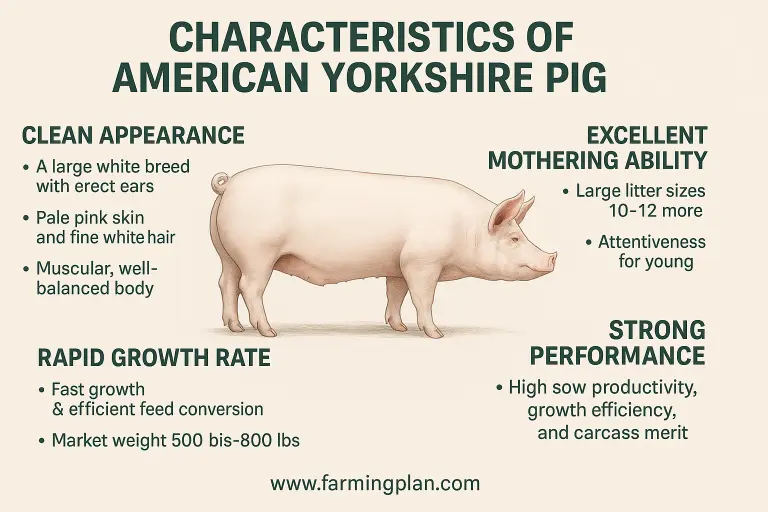
One of the most important characteristics of the Yorkshire is its excellent mothering ability. Sows are known for their large litter sizes, often producing 10 to 12 piglets or more, and for caring for their young attentively. This strong reproductive trait makes Yorkshires a top choice in commercial pork production, especially for breeding durable mother lines.
Yorkshires are also recognized for their rapid growth rates and efficient feed conversion. With the right diet, they can reach market weight quickly—usually between 500 to 800 pounds—which means more meat in less time. Their low backfat records and muscle composition make them ideal for producing high-quality pork that appeals to modern consumers.
In terms of performance, these pigs consistently score high in sow productivity, growth efficiency, and carcass merit. These records are tracked by breeders and large stock companies using central genetic evaluation programs, ensuring the breed continues to improve year after year.
With strong bones, balanced body temperature, and good adaptability, the American Yorkshire is not only a productive pig breed but also a versatile breed suited to many farming setups.
Nature & Temperament
The American Yorkshire Pig is not only known for its size and meat quality but also for its calm and friendly temperament. Farmers love working with Yorkshires because they’re intelligent, easy to manage, and quick to adapt to their environment. These pigs respond well to human interaction, especially when raised in clean and comfortable conditions.
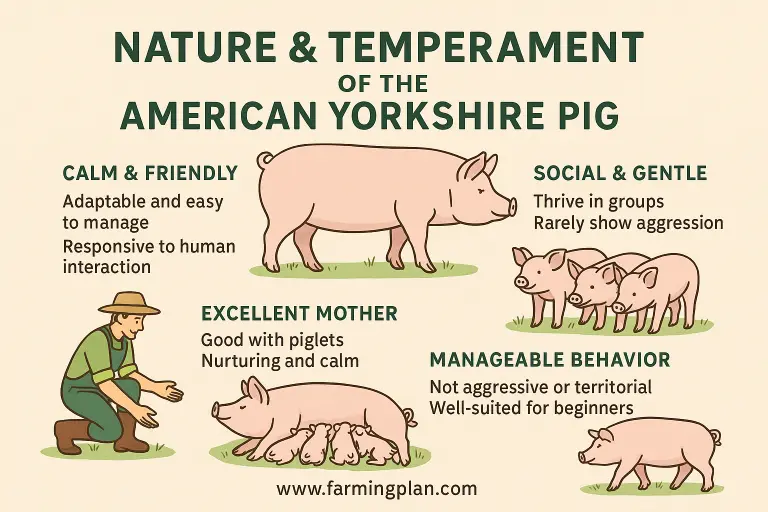
Yorkshires are naturally social animals. They thrive in groups and rarely show aggression, making them ideal for commercial farmers and even smaller family-run farms. This gentle behavior is especially important during breeding and farrowing, as sows need to remain calm around their piglets. Their excellent mothering abilities also reflect their nurturing nature, which helps increase survival rates in larger litters.
Even though they are large and muscular, Yorkshires are not aggressive or territorial. Their calm disposition reduces stress within herds, which improves overall health and meat quality. Because of their manageable behavior, many farmers choose Yorkshires for crossbreeding programs, helping pass on good temperament to the next generation of pigs.
Their behavior also makes them a good choice for beginners in pig farming. If you’re new to raising pigs, the American Yorkshire Pig offers a low-risk, high-reward experience, especially when it comes to daily care and feeding.
Food & Diet for the American Yorkshire Pig
Feeding the American Yorkshire Pig the right diet is key to its health, growth, and meat quality. These pigs have excellent feed conversion efficiency, meaning they turn food into muscle faster than many other breeds of swine. A well-balanced diet helps them reach full size—between 500 and 800 pounds—while keeping them healthy and productive.
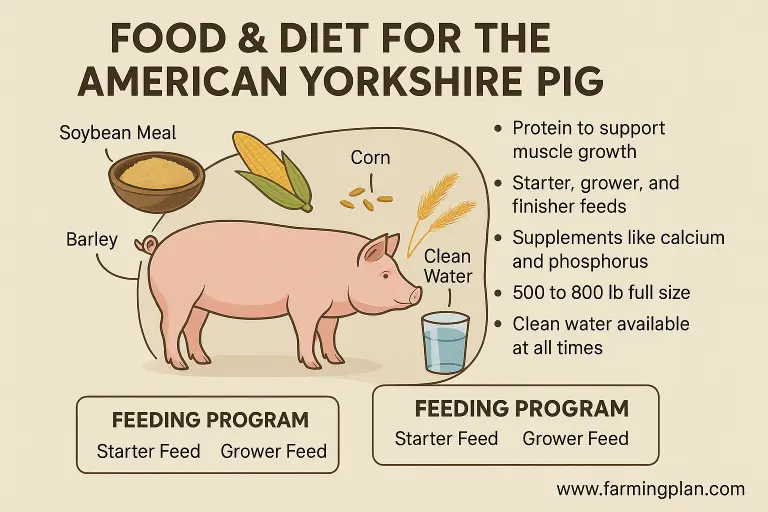
A Yorkshire’s diet should include plenty of protein to support muscle growth. Sources like soybean meal, corn, and barley provide the energy and nutrients needed for fast growth. Young pigs need more myofibrillar proteins and contractile proteins to build strong muscles early in life. Clean water must always be available, as hydration supports digestion and temperature regulation.
Farmers often use a feeding program broken into stages: starter feed for piglets, grower feed for juveniles, and finisher feed for pigs approaching market size. Each stage includes different percentages of protein, minerals, and vitamins to match the pig’s changing needs. Supplements like calcium and phosphorus support bone growth and help prevent developmental problems.
Read More: Berkshire Pig: The Rare Breed in the UK
Usage & Purpose
The American Yorkshire Pig plays a major role in both small farms and large-scale commercial pork production. Known for their exceptional meat quality and lean muscle to meat ratio, Yorkshires are one of the most popular breeds for farmers aiming to produce high-quality pork efficiently. Their meat is tender, flavorful, and contains ideal levels of connective tissue proteins and myofibrillar proteins, which contribute to excellent texture and taste.
Yorkshires are especially valued for producing bacon, making them the go-to bacon breed across many regions. Their carcass merit is high, with minimal backfat and maximum usable meat, making them profitable for both local butchers and international pork markets. Whether you’re producing pork chops, ham, sausage, or ribs, this versatile breed fits nearly every commercial meat production goal.
Beyond meat, their excellent mothering abilities make them crucial in breeding programs. Farmers often use Yorkshires as the foundation of durable mother lines because they produce larger litters and show strong maternal care. Their ability to raise more piglets per cycle boosts farm productivity and profit.
Yorkshires are also used in crossbreeding programs to improve traits in other swine breeds. For example, combining a Yorkshire with a Duroc or Landrace can produce offspring with even better growth rates and efficient feed conversion. Thanks to their adaptability, good temperament, and reliable performance records, Yorkshires remain a top choice for anyone in the pork industry—from family farmers to large stock companies.
Read More: Celtic Pig: Farming Tips and Tricks Revealed
Special Features of the American Yorkshire Pig
The American Yorkshire Pig stands out among productive pig breeds because of its unique combination of traits that benefit both commercial farmers and small-scale breeders. One of its most notable qualities is its exceptional mothering ability. Yorkshire sows consistently produce larger litters, and their nurturing behavior ensures higher survival rates for piglets.
Another special trait is their efficient feed conversion. These pigs can turn feed into lean meat quickly, making them ideal for operations focused on meat production efficiency. Their feed-to-weight gain ratio saves farmers time and money, especially in environments where every pound of feed counts.
The physical characteristics of Yorkshires are also unique. They have a white body with erect ears, giving them a distinctive look. Their strong muscular body, clean appearance, and durable build make them suitable for both indoor and outdoor settings. Their color hair and skin are light, which helps reduce sun sensitivity when raised outdoors.
Yorkshires also have a muscle-to-meat advantage, offering higher yields of tender pork with less backfat. This gives them a competitive edge in markets where high-quality pork is in demand. Their carcass merit and composition of meats meet the strict standards of top-tier meat processors.
Read More: Poland China Pig: The History of the American Breed
Health Issues & Prevention
Keeping your American Yorkshire Pig healthy is key to raising a strong, productive animal. While this breed is known for its durability and strong body, there are still common health concerns every farmer or breeder should watch out for.
Some of the most frequent health issues in Yorkshires include respiratory infections, digestive problems, and joint stress due to their large size (often reaching 500–800 pounds). These pigs are also prone to skin issues if raised in dirty or overly moist environments. Dirty bedding can lead to skin rashes or even parasite infestations.
To prevent these problems, farmers must focus on cleanliness and comfort. Clean pens regularly, ensure proper airflow, and avoid over-crowding. Yorkshires also need a balanced diet rich in protein, vitamins, and minerals to support their bone growth and overall body temperature regulation.
Another issue to monitor is slow growth rate in piglets, which can be caused by poor nutrition or underlying illness. Watch for signs like lack of appetite, weakness, or irregular stools. Early treatment and supportive care, including electrolytes and proper feeding, can make a big difference.
Vaccination and regular vet checkups are vital. Work with a local vet to build a preventive health program tailored to your pigs’ environment. This might include vaccines for swine flu, E. coli, and parvovirus, plus deworming treatments every few months. Keep detailed performance records and observe your pigs daily. Catching symptoms early gives you the best chance to treat effectively and protect your whole herd.
“Strong, Muscular, and Reliable – The American Yorkshire Pig is the Backbone of Modern Farming!”
Step-by-Step Farming Guide for Raising American Yorkshire Pigs
Raising American Yorkshire Pigs requires attention to detail, knowledge, and a systematic approach to ensure both their health and productivity. Here’s a step-by-step guide to help you succeed with this incredible breed:
Prepare the Space
Before bringing your American Yorkshire Pig onto your farm, ensure you have a clean, dry, and spacious living area. Yorkshires need room to roam and root around, so provide ample space for them to move. If you’re raising pigs outdoors, invest in secure fencing to keep them safe.
Choose the Right Diet
From the moment they’re born, feed your Yorkshires high-quality, age-appropriate feed. Start piglets on starter feed, then transition to grower feed and finisher feed as they grow. Provide clean, fresh water at all times, as it is vital for digestion and temperature regulation.
Health Monitoring and Care
Ensure your piglets and adult pigs are regularly monitored for health problems. Watch for signs of respiratory infections or skin issues, and treat them promptly. Keep detailed health records, including vaccinations, treatments, and growth rates.
Proper Breeding Practices
If you’re using your Yorkshire pigs for breeding, select only the best breeding stock with a history of good performance records and strong mothering abilities. Keep detailed breeding records and manage your pigs to ensure genetic diversity and quality in your offspring.
Create a Breeding Schedule
Set up a breeding program to optimize productivity. Yorkshires are known for their excellent mothering abilities, so plan your breeding cycles carefully to ensure a steady supply of piglets and maintain optimal sow productivity.
Maintain Proper Hygiene
Regularly clean pens and feeding areas to prevent infections. Ensure that bedding is fresh, and that waterers and feeders are regularly cleaned to avoid the spread of disease. Routine parasite control is also necessary to maintain good health.
Monitor Growth Rates
Keep track of your pigs’ growth to ensure they are achieving their target weights. Yorkshires are known for their rapid growth, but they still need proper care to reach market weight efficiently, often between 500 and 800 pounds. Adjust their diet as needed to support consistent growth.
Record Keeping
Maintaining accurate performance records, including growth rates, litter sizes, and health updates, is crucial. This will help you monitor the effectiveness of your farming practices and make data-driven decisions on feeding, breeding, and health care.
Prepare for Market
When your pigs are ready for market, ensure they meet the required standards for meat quality and carcass merit. Their lean muscle and low backfat will provide top-notch pork cuts, making them ideal for commercial pork production.
FAQ
What is the origin of the American Yorkshire Pig?
The American Yorkshire Pig traces its roots to 18th-century Yorkshire, England, where it was developed by crossing the large indigenous white pig of North England with the smaller, fatter, white Chinese pig.
What are the distinctive physical characteristics of the American Yorkshire Pig?
The American Yorkshire Pig is characterized by its large and muscular body, erect ears, and smooth white skin.
How big do American Yorkshire Pigs get?
American Yorkshire Pigs typically weigh between 500 to 700 pounds for females (sows) and 600 to 800 pounds for males (boars).
What is the lifespan of an American Yorkshire Pig?
The lifespan of an American Yorkshire Pig is typically 6 to 10 years on a farm, and up to 15 to 20 years if kept as a pet.
What are American Yorkshire Pigs used for?
American Yorkshire Pigs are primarily used for meat production, known for their lean and tender pork. They are also commonly used in crossbreeding programs to improve traits in other swine breeds.
Conclusion
The American Yorkshire Pig is a highly valued breed in the swine industry, renowned for its excellent meat quality, adaptability, and strong maternal instincts. Originating from 18th-century England, this breed has become integral to modern pork production. Its distinctive characteristics, such as a large, muscular body and erect ears, contribute to its prominence. With a lifespan ranging from 6 to 10 years on farms, American Yorkshire Pigs are primarily utilized for meat production and are also favored in crossbreeding programs to enhance desirable traits in other swine breeds. Their combination of size, temperament, and productivity makes them a top choice for farmers and breeders alike.

